There has long been an argument raging about the importance of I.Q. vs E.Q. It isn’t surprising that those who most value rational thought, logic and solid technical skills are most impressed with I.Q. Those who value intuition, relationship and people skills are more impressed with E.Q. Raw intelligence versus E.Q., emotional intelligence.
I am certain there are situations where individual performance is absolutely critical to success regardless of the lack of self-awareness (emotional intelligence.) In most circumstances though, study after study confirms most top-performing individuals and teams rank self-awareness the critical trait necessary for success. Recently a survey of Navy Seals, an organization that demands the ultimate in performance from each team and team member, concluded decisively that emotional intelligence, as measured by the level of trust each Seal member elicits, is more highly valued than raw ability and individual performance. Make no mistake, high performance for each team member is critical, yet the study showed teams performed better in an environment of high trust even with some sacrifice of performance. They had no use for arrogant “stars”.
Coaching has as a foundational principle that all of us are created with a brilliance and potential that can propel us to magnificent achievements. Throughout every age to present day, people of exceptional accomplishment have realized the extraordinary talent in themselves, as well as in others. Coaches see the untapped capacity in their clients, and simply support their discovering for themselves. A key aspect of unleashing exceptional ability includes creating a trusting environment and culture.
That is exactly what “Self-awareness” coaching accomplishes. The more deeply we know ourselves, the more we can realize the magnificence in others and ourselves, not in an arrogant way, but as a realization that all of us have that potential. When we are fully self-aware, we are fully free of fear and self-imposed limitations which leads to high trust and high performance.
Stephen Covey Jr., in his book The Speed of Trust developed a 13 step outline for creating an environment of high trust, and an self-assessment inventory for measuring how our individual behaviors aid or impair our ability to create a trusting environment. If you would like to have us provide a sample of those tools, email or text us. You can also pick up a copy of The Speed of Trust. This is a great book and incredibly useful.
When our behaviors naturally create a highly trusting environment, you can be sure you are exhibiting very high levels of self-awareness and self-esteem. This is a particularly successful and delightful state from which to lead your life, whatever your endeavor may be.
Tom Searcy, BCC
info@spiritofeagles.com
574-850-9912


Recent Comments